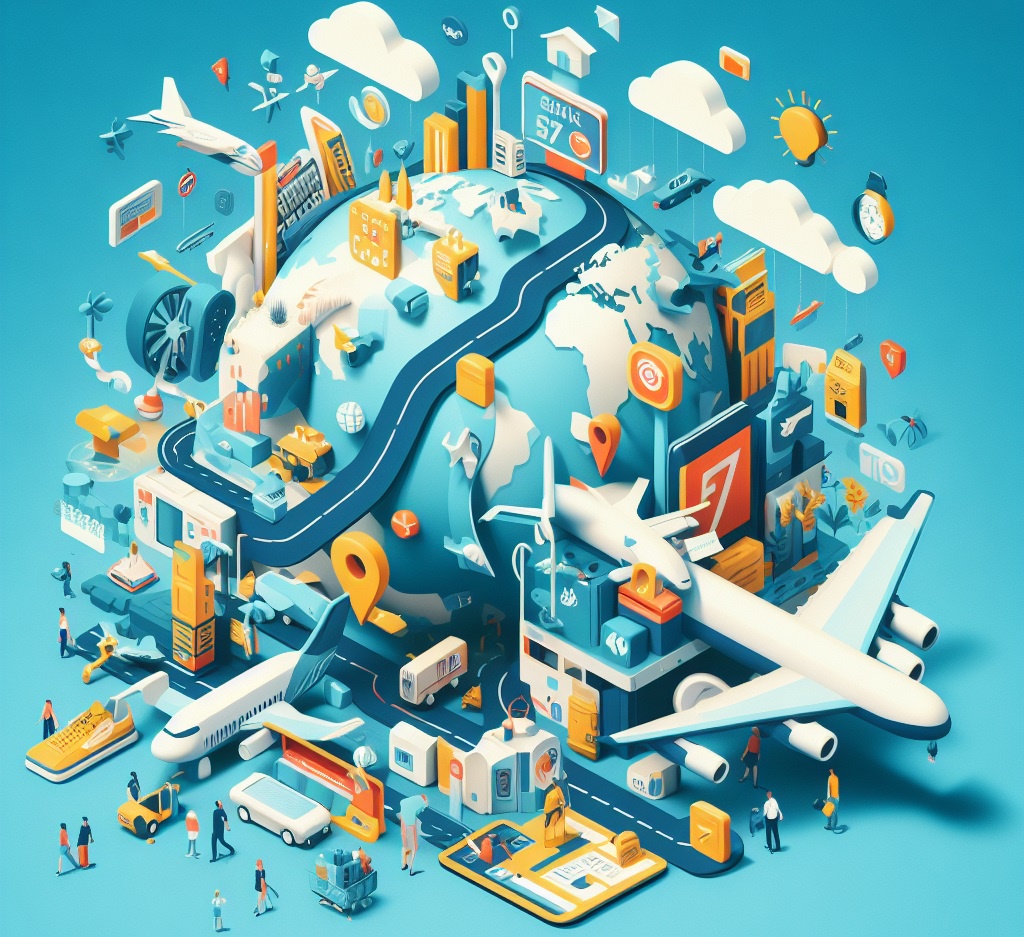Overview
The contemporary travel sector is undergoing extensive metamorphosis, predominantly prompted by the swift progression of technology. Innovations like mobile applications, facial recognition, virtual reality, and artificial intelligence are redefining how we conceptualize, organize, and engage with travel. These advancements have radically altered the travel domain, providing a plethora of advantages for both the tourism companies and travelers.
Among these innovations, mobile applications have emerged as crucial instruments for travelers. They have significantly simplified the process of arranging trips, reserving flights and accommodations, and uncovering local points of interest and dining places. With bespoke suggestions grounded in previous travel experiences and preferences, mobile applications have significantly personalized the travel experience. Furthermore, the incorporation of data analytics into these apps facilitates tailored journey planning, fluid payment solutions, and bolstered security implementations at airports and transit centers.
Facial recognition technology has also significantly contributed to reshaping the travel industry. By leveraging biometric data, it strengthens security and safeguards, while concurrently adding a personalized element to the travel experience. Utilizing facial recognition, travelers can delight in personally tailored suggestions for flights, accommodations, and activities, along with efficient trip organization and expedited billing summaries.
Virtual reality has ushered in a new era, allowing travelers to explore destinations and attractions in an immersive and interactive fashion. Through virtual reality, people can virtually experience desired locations, reducing the environmental impact associated with conventional tourism. This sustainable modality aligns with the changing inclinations of environmentally-conscious travelers, on the lookout for immersive expeditions.
The role of artificial intelligence cannot be overstated in augmenting the travel industry by offering effectual services and bespoke recommendations. AI-powered systems, by taking advantage of past consumer travel experiences and preferences, can provide individualized flight, accommodation, and activity suggestions. Furthermore, AI-driven automation simplifies repetitive tasks like booking confirmations and customer service, saving precious time for travelers and industry professionals alike.
This article delves into these transformative technologies and their effect on morphing the travel sector into a more personal, efficient, sustainable, and safe industry. By grasping these advancements, both travelers and businesses can harness their potential and adeptly navigate the evolving dynamics of the travel industry in the digital era.
Mobile Applications
Mobile applications have dramatically evolved the travel industry. They have simplified trip planning, flight and hotel bookings, and even discovering local attractions and dining spots for travelers. The primary benefits of mobile apps in the travel domain include:
Personalization: Mobile applications utilize data like past travel experiences and preferences to provide personalized recommendations.
Data-driven service offering: Mobile applications leverage data analytics to provide personalized journey planning, email and calendar integration, and expedited billing summaries.
Security and Safety: Mobile apps employ facial recognition technology to enhance security and safety protocols at airports and travel centers.
Seamless Payments: They facilitate fluid payments for travel-related expenses.
According to various sources, mobile applications are positively reshaping the travel and tourism sector. By 2024, their benefits to tourists and companies are predicted to extend from augmented communication, paperless transactions, seamless interconnection, to expanding payment alternatives.
Facial Recognition
Facial recognition technology is another crucial technological advancement impacting the travel domain. It can enhance security protocols at airports and transit centers and personalize consumer travel experiences, offering critical benefits:
Personalization: Facial recognition technology can provide individually tailored flight, hotel, and activity suggestions.
Data-driven service offering: By aiding personalized trip planning, email and calendar integration, and quick bill summarization.
Security and safety: Enhancing security and safety measures.
Facial recognition technology aids the travel and tourism industry in comprehending traveler needs, optimizing service offerings, and delivering value-based services, while data-driven services facilitate personalized trip planning, email, and calendar integration, and expedited bill summaries.
Virtual Reality
Virtual reality (VR) holds significant potential to revolutionize the travel domain. With VR, travelers can enjoy destinations and attractions in a more immersive and interactive way. Key benefits of VR in travel include:
Personalization: VR can provide bespoke flight, hotel, and activity suggestions.
Data-driven service offering: VR can aid personalized trip planning, email and calendar integration, and quick bill summarization.
Sustainability: VR can cut down the environmental impact of travel.
According to McKinsey, virtual reality could bring in over $20 billion in revenue by 2030.
Artificial Intelligence
Artificial Intelligence (AI) has generated substantial impact on the travel sector. AI can augment the travel experience for consumers by offering tailored recommendations for flights, hotels, and activities. Key benefits of AI in the travel sector include:
Personalization: AI can provide personalized suggestions based on past experiences and preferences.
Data-driven service offering: AI can deliver personalized trip planning, email and calendar integration, and quick bill summarization.
Efficiency: AI can automate repetitive tasks like booking confirmations and customer support.
Different sources highlight that AI is already influencing the travel and tourism industry significantly. With AI-enhanced features becoming common, travelers can anticipate more proficient services and better-personalized recommendations.
Conclusion
Undeniably, technological innovations have revolutionized the travel sector, offering numerous advantages and transforming our travel engagement. Mobile apps have rendered travel planning and reservations more convenient, offering personalized recommendations and fluid payment solutions. Facial recognition technology has bolstered security procedures and personalized customer travel experiences, while virtual reality has unlocked new possibilities for immersive and sustainable expeditions. Lastly, artificial intelligence has optimized efficiency by automating tasks and providing tailored recommendations based on past travel history.
These technological breakthroughs have not only enhanced customer travel experiences but also presented vast opportunities for businesses. With continuous technological evolution, the travel industry is predicted to grow and innovate further. The potential rewards are vast, with predictions implying billions of dollars in revenue and a more sustainable future for travel. As the industry advances, it is essential for businesses and travelers to latch onto and acclimate to these technological enhancements, to fully exploit their potential and establish a more smooth and personalized travel experience for all.
Read more on OSAM TOUR travel platform.


No comments yet